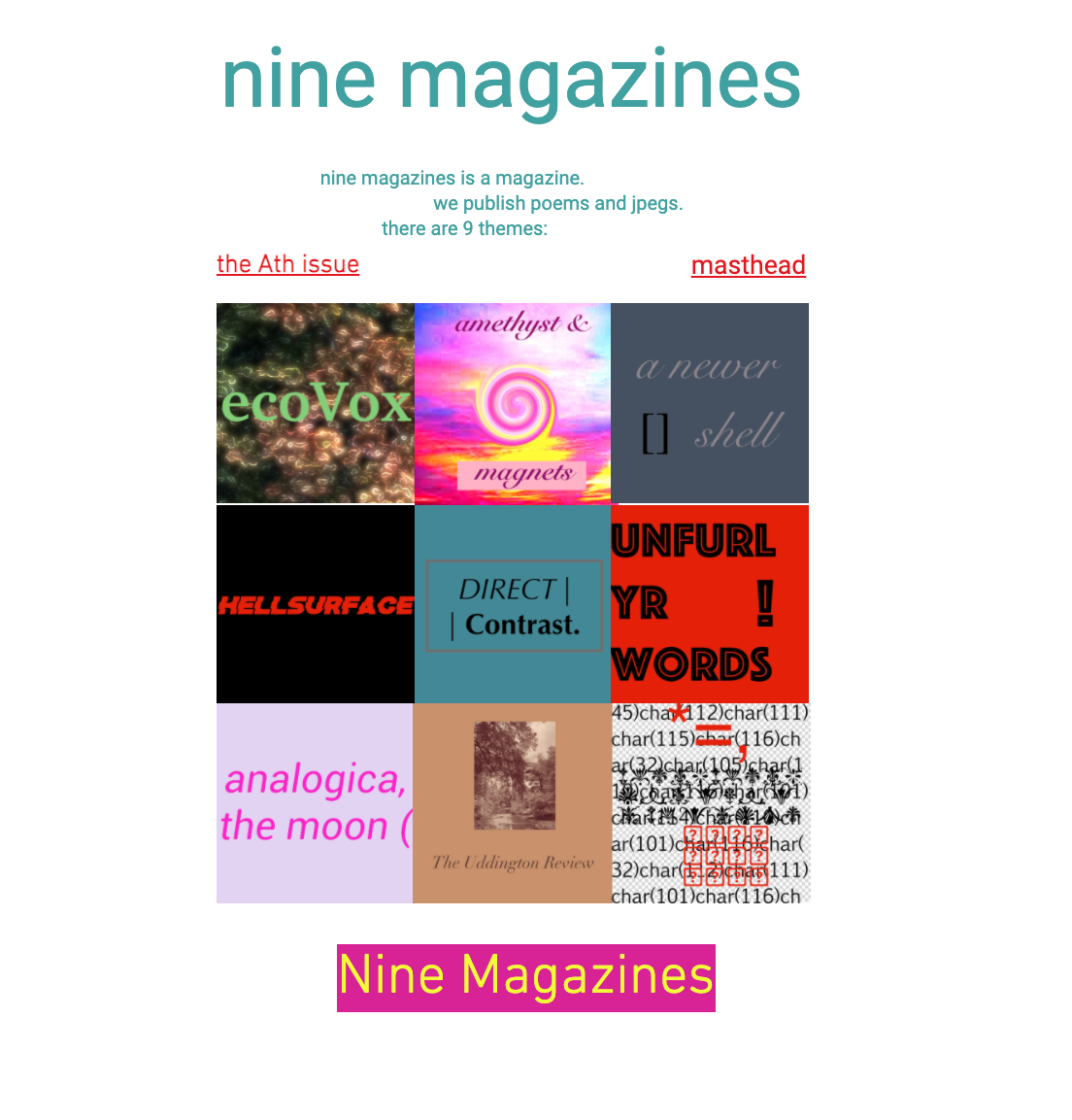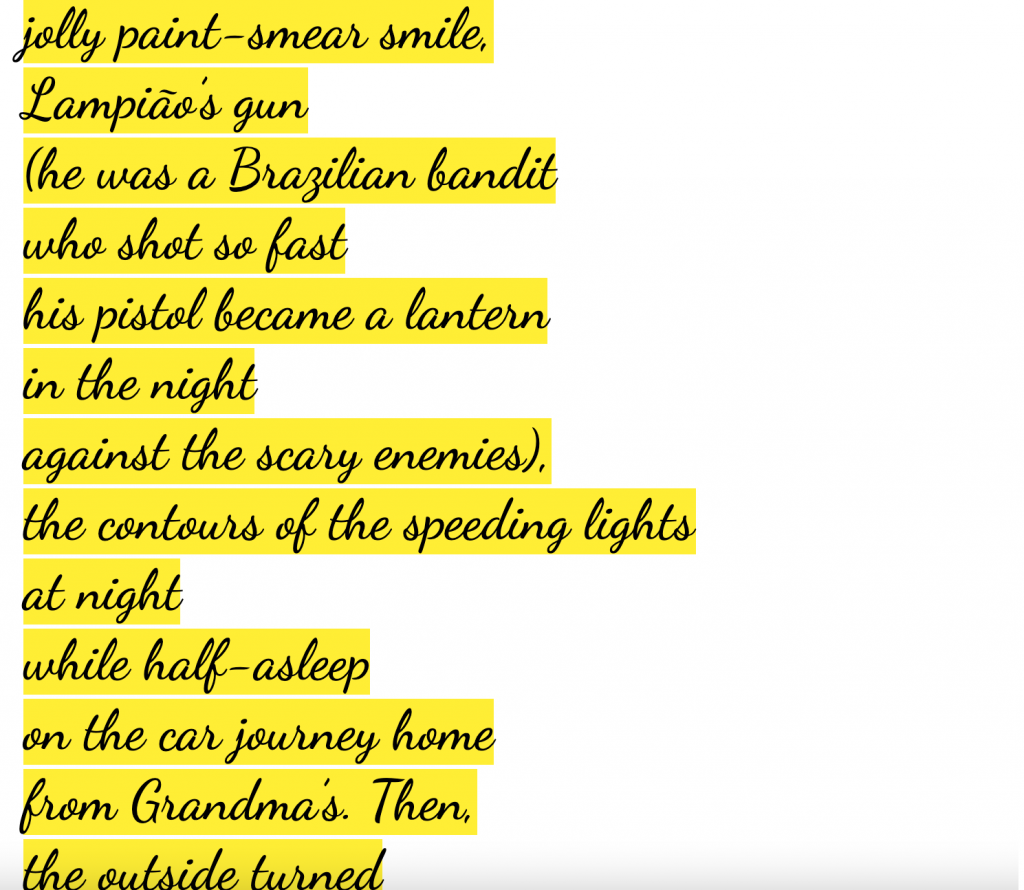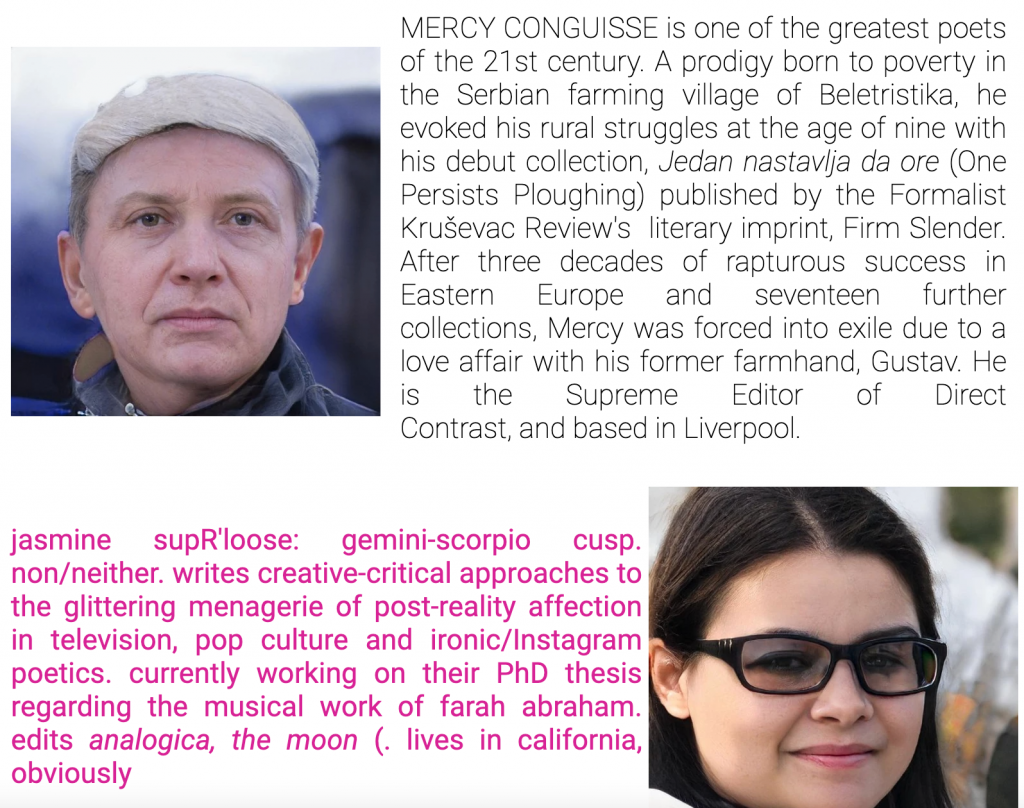Where does the magazine – and its forms, codes, public intimacies – fit into online literary culture? Ian Macartney investigates via nine magazines
The online literary magazine ecosystem is a sort of arena where there are very strict adherences to rules and etiquette, but also a performed candidness which I believe conceals certain social economics. Strange fealties emerge via social media interactions: the power dynamics between contributor/editor, submitter/guidelines, the follower/following-back. These are potent, and unresolved, situations. There is an aura which makes said fealties seem unplaceable, limits I could not express prosaically. It was only through nine magazines that I could reveal there was, indeed, something very calcified about how we interact with literary magazines online, and how they operate. A quality of the seeming-infinite; an inevitable power not only synonymous to the internet, but also microcosms of the internet.
nine magazines is, as its name suggests, a website which hosts nine ‘themes’, each of which takes the form of a mini-magazine. Each theme is an archetype of a literary magazine I have seen during my time as a writer. Some are directly inspired by specific publications I admire (analogica, the moon ( is SPAM; Direct Contrast is PN Review) while others are situated around internet subcultures, or the internet’s propensity to foster their growth. HELLSURFACE, for example, takes inspiration from the word-spaghetti of the reactionary ‘Dark Enlightenment’, popularised by Nick Land, while The Uddington Review is totemic for any local-interest or parochial magazines that more traditional poets have set up online. UNFURL YR WORDS is essentially the entire spoken-word/slam scene. amethyst & magnets represents the type of magazines a lot of young people have set up during lockdown, particularly in North America, and a newer shell mirrors what I perceive as popular journals which publish metropolitan poetics, ‘lowercase’ in temperament, like The Poetry Review or Ambit. ecoVox was not inspired by poetry magazines, per se, but rather the rising (necessary) prominence of ecology in contemporary writing – but also where it fails (i.e. the conflation of political change with cultural response).
In this ‘meta-magazine’ I traded the sanctity often reserved for literature with a deranged internet logic which, as a writer in my early 20s, I find inescapable – and in doing so, intend to ask what it even means for literature to exist in the infinite textual sprawl that is the internet, i.e. our current cultural lives.
I found several ways to do this. First, half the contributors are me. nine magazines gave me the opportunity to self-present in new and colourful ways, but with a distance. The project is a kind of digital pamphlet – through my gang of pseudonyms I reverse the egalitarian pretences of the magazine, the idea that finely attuned work has been filtered through with no room for bias, allowing me to reframe my work. ‘Olaf Skyler’, for example, is the name given to nature poems I wrote when I was fifteen. Although I believe the poems hold up to scrutiny I am also very aware of their wide-eyed neo-romanticism which, on the one hand, I want to champion beyond dismissals of ‘juvenilia’, but on the other hand, I admit the limits of this worldview. In putting sincere poems on an absurd parodic platform, I wanted to ask: does the work become negated, here, or does it double in meaning? Which implies a wider question: is the act of putting a poem on the internet inherently absurd? Are we to really expect a poem can pause the infinite scroll?
Secondly, I accepted every submission sent my way. Being selected for publication often feels like the acquisition of medals, titles which will garner author bios to prove the legitimacy of an artist. These mythologies of literary success, the ceaseless need to have ‘made it’, negate the ideal state of the literary magazine as a community-creating force. With nine magazines I wanted to feel out the limits of this competitiveness, but also express gratitude for the communal aspects of literary magazines, and therefore diminish the curational edge at play otherwise.
After all, now the mechanics of publishing are accessible to everyone with an internet connection, quality is no longer the defining characteristic of a publication. This begs the question: if publishing is no longer an intrinsic determiner of value, where is that value? Does it still exist? By accepting every submission I replaced competitive impulses with a pivot to project-specific aesthetics. The surprise, the value, is not in my ability to curate or find “the finest” work (which is already a fallacious category), but rather dependent on presentation – meaningful surfaces. The masthead, for example, are all fictitious creations. Their photos were generated by AI. Dupont, editor of a newer shell, who is bitter enough to mention in her bios that “although she did not win” a non-existent poetry prize, she did receive a completely unrelated “William J. Buutsur Bursary”. The Uddington Review’s Doris McSwitch only loves “most” of her grandchildren, while Direct Contrast’s Mercy Conguisse (“one of the greatest poets of the 21st century”) had an affair with “his former farmhand, Gustav”. Author bios are usually a type of prose fiction – the fiction of the ‘successful author’, of an author’s personality and/or achievements – which permeate the online literary magazine, and a major engine of literary competitiveness, but here it becomes farcical melodrama.
My final tactic was the visual identity of nine magazines itself. I aimed to go for a ‘semiotic barrage’, a sensory assault emblematic of the internet. This strategy originates in webcomic artist Scott McCloud’s concept of the ‘infinite canvas’. For McCloud the internet unlocks a limitless space for artists to express themselves. The page no longer has a physical limit; a drawing can be as large as a webpage needs to be. In nine magazines I utilise the infinite canvas for the use of text. Lines and stanzas stretch way farther than a marginated page would allow, spilling over on to other pieces; some poems are presented lopsided or upside-down; poems arrive in gaudy fonts and colours and highlights or as screenshots, hyper-filtered. It is through the infinite canvas that the ‘real’ internet breaks through the veneer and shells of the competitive online literary magazine, a ‘real’ rendering what we often ask of poetics (i.e. the sacredness of text) futile.
This is how literature becomes freed from certain responsibilities. In my discussion with Rishi Dastidar for the Spoke in Mirrors interview series, we discussed how “skimming” text has become the standard mode of reading, especially online – the relegation of text as surface-rich, not because literacy has decreased. but because of the exact opposite. After all, my generation is the most literate yet – our primary mode of communication is epistolary, via corporate platforms such as Messenger, Snapchat or Instagram/Twitter DMs. It is not that text or literature has become irrelevant online, it just performs differently. It is not that digital life is meaningless, it is just too meaningful. Too many interpretations and opinions are presented at once; it is the cultural singularity, digital hyperstimulation, the overwhelm, multitasking as an ontological state.
I wanted to reveal this meme logic in something as sanctified as the poem, and the poem’s home of the literary magazine. This was not to diminish literature, per se, but rather to reveal where poetics survive. Because ultimately, nine magazines is an attempt at nascence: taking a form more codified than assumed – the online literary magazine – and revealing where the limits encroach, and where we could go next. It’s a ‘meta-magazine’ in the sense of meta as metaxis – inbetweenness. In the space between outright parody and emulation, something exciting can thrive.
Read nine magazines at ninemagazines.com.
Ian Macartney is a writer. He can be found at ianmacartney.scot




